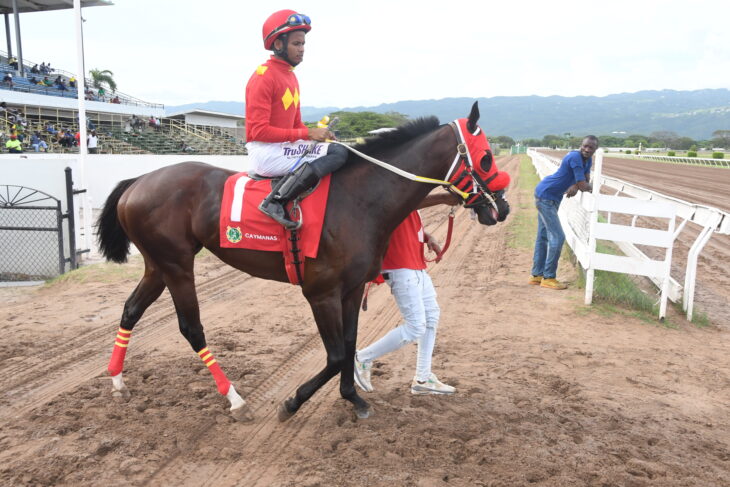
Most Jamaicans who only know Caymanas Park ask me why I’m so interested in English racing.
It wasn’t always that way. During my primary and secondary school years, I was a local racing fanatic. In those halcyon days, Jamaica Raceform (owned and published by the legendary Lucien Chen and John Bradbury of “CBA” syndicate fame subsequently immortalized in the Pioneers’ Pay Bookie Man Pay) was published on Tuesday for Saturday’s races. My private circle read voraciously and analyzed daily until Friday afternoon when post position draws and jockey declarations were broadcast live on radio.
Then came Friday night! With all the information finally available we studied harder than for any exam and made our selections. We often ran a points-based competition (5-3-1 points awarded for first; second; third respectively) with the winner owning bragging rights for a week. I keep telling youngsters chasing a quick buck that betting or winning money isn’t horseracing’s Holy Grail. It’s nothing more than proving you were right. Friday night is the fun prep. Saturday afternoon is the exam.
Because, as Damon Runyon wrote about us “all horseplayers die broke”. BUT, about each and every loss, “a story goes with it.”
Truth be told we were assisted in our fanaticism by the most competitive racing in Jamaica’s history. Horses like Saumaurez, Cresta Run, Bonnie Blue Flag, Kandahar, Spred Satin, None Such and, later on, Papacito, Monte’s Stitch, Legal Light, Arizona, Balladier, Reca, Royal Dad et al ensured the product was exciting. Later I realized these horses came mainly from strong European bloodlines unlike the cheap American stallions now the norm.
Then, somewhere around 1971, while still in the midst of my fascination of Caymanas Park racing, Dessie, the Domino Genius, introduced me to English racing. We walked from Mona Heights to Barbican Road (about where Burger King is now) and entered a small betting shop run by a “friend” of Dessie. We were the only customers and, together, we scraped up 50 cents which could buy one bet. Dessie advised on the horse to back and, to our delight, we listened to rice-krispies “commentary” (snap-crackle-pop) from a local commentator on a two-way radio. It was thrilling to hear “live” commentary on races run thousands of miles away. Later I discovered the commentary was far from “live” but “interpreted” by a commentator in the bookie’s head office from a sparse telex (remember them?) from England only informing the positions at each distance marker.
I was hooked.
I started to learn everything I could about English racing. I sent away for the Timeform Black Book (arrived 3 weeks stale but was studiously devoured); read Raceform (a newspaper fore-runner to Racing Post available at Novelty Trading outlets); and savoured anecdotal lessons from fellow acolytes including the late, great Langston “Lammy” Burke, a Standpipe resident and occasional construction site worker who was the most erudite student of English racing I’ve met.
But what attracted me most was the variety. Tracks were left AND right handed (unlike Jamaica or USA’s exclusively left-handed tracks). Also tracks had individual characteristics so, apart from general form, you’d better know which track suited which horse. Then there was the “going”.
Dennis Emmanuel Brown would say: “Some like it hot. Some like it cold.”
What also fascinated me was that almost every track had a mirror-image (ran in the opposite direction) elsewhere. So Epsom and Brighton (quirky, left-handed switch-back tracks) were mirrored by Goodwood and Windsor (right-handed, switch-backs). Goodwood also has the quickest sprint track — downhill almost all the way. Flat left-handed tracks like York and Doncaster were countered by flat right-handed tracks like Kempton (now with a synthetic surface) and Musselburgh. Left-handed tracks with stiff uphill finishes (e.g. Pontefract) were mirror-images of Beverley. Ascot, Leicester and Sandown (right-handed) also have stiff uphill finishes but they are galloping tracks (more suitable for far-striding types) while Pontefract and Beverley are sharp tracks (suits quicker-actioned, speedier horses). Chester (a tight, flat, left-handed oval only about seven furlongs around) seems unique but it’s mirror can be found in “Little England” where the Garrison Savannah is a right-handed Chester. Nowadays, some English tracks have synthetic surfaces including Polytrack (Kempton, Lingfield and Chelmsford); Tapeta (Newcastle) and Fibresand (Southwell).
Variety abounds. There’s no opportunity to be bored. Punters prepared to do the work frequently find value bets when public favourites can be eliminated from consideration based on track type.
As a result of the variety of racetracks, experienced European jockeys are far more skilled than American counterparts who ride the same left-handed, flat ovals with dirt surfaces daily. Only greats like Bill Shoemaker, Steve Cauthen and Gary Stevens successfully made the transition to English racing. Others flounder. Our own Winston “Fanna” Griffiths sat at the feet of great English Jockey Joe Mercer, who spent a long time in Jamaica, and honed his craft.
To this day, I suspect most local horseracing fans just don’t understand the distinction between left and right-handed tracks because very few of us understand the value to horses of their lead leg. Most remain clueless regarding the purpose of a horse changing its lead. I suspect many of Jamaica’s public horseracing pontificators can’t tell when a horse changes its lead leg. Everybody has a favoured leg. If we stand up for a long time we almost always change the leg we were favouring to shift the burden. Horses are no different. Most prefer a left lead so go best around left-handed turns. But many prefer their right lead so go best on right-handed tracks. A select few are versatile.
But no matter its preference, every horse that runs an entire race on one lead will tire, so the best jockeys know how to get their mounts to change legs in the straight for an additional burst of energy. High-class American jockey James Long once told me that any jockey who hits his horse on the turn is an idiot. That horse will assume you want it to change leads and can become unbalanced. Again, Jamaican jockeys, by and large (“Fanna” being a supreme exception) have no idea how to use a whip.
Last time we were together I wrote about whip abuse by jockeys:
“Let’s hope this weekend’s Derby will be run without any abuse of any kind. It’s billed as a rematch between Blue Vinyl and Atomica. I confidently expect Atomica to turn the tables on her St Leger conqueror.”
Atomica won, but how many saw the ridiculous use of a left-handed stick by her jockey inside the final 200m when the race was already won? She shied away from the whip and nearly threw the race away.
Sigh.
DEPARTMENTS:
Clocked-In
Abbreviations: CT = “Corrected Time”; TV = “Track Variant” (a calculation of track conditions’ effect on official times to arrive at “real/corrected” times); TVs are expressed in fifths of a second; “minus” (-) means a fast track; “plus” (+) a slow track (e.g -2 is fast by 2/5th second). Variants beside horse’s names represent the difference between its official time and the grade standard.
Plenty occurred since last we met so we’ll only hit the most recent highlights.
SEPTEMBER 10, 2022 [TV+0.4 per 200m (Round); +6 (straight)]
Bern Notice (-3) destroyed a high quality field (Race 10; $1,000,000 claimers; 1500m; TV+3) winning by 14 lengths in 1:33.0! His CT (1:32.2) is 4/5th second faster than Overnight Allowance standard. He deserves a second chance there after running into some tartars first time around.
Don Vicenzo (-2½) 2nd (Race 3; 3yomaiden condition; 1500m; TV+3) is a late foal so the Derby probably came too soon but he’s developing into an above average stayer. His staying on second in 1:35.1 converts to a CT of 1:34.3 – over a second faster than the grade standard. Losses are only lent.
Overseas Betting Opportunities (OBOs)
Before we meet again the popular Autumn Double (last two big flat turf handicaps) will have begun with the Cambridgeshire (Newmarket; September 24; 9f straight; 1540 GMT; 9.40a.m. Jamaica Time) where I’ve my fingers crossed for notebook horse Saga, now owned by The King, to score a sentimental win. The good news is he also has the form to make this happen.
Two Saturdays afterwards, the Cesarewitch (Newmarket; 2m2f; 1540GMT) will be run (only one turn)! My very early fancy is Echoes In Rain a classy dual purpose Willie Mullins inmate that won three of seven flat starts including the Connacht (Premier) Handicap (Galway; 2m1f; July 25). He’ll relish softish conditions. Low number draws have an advantage in this race.
Here’s another notebook horse:
Isaac Shelby [2yo ch.c Night of Thunder-Kentucky Belle (Heliostatic)]
This promising two-year-old is unbeaten in two career starts. He progressed significantly on his second start showing speed, pace and determination to beat favourite Victory Dance (subsequent winner of a listed Newbury event) by a head (Newmarket; July 9; Group 2 Superlative Stakes; 7f; good- firm). This is a good three-year-old in the making and a likely Guineas contender.
Good Luck!



